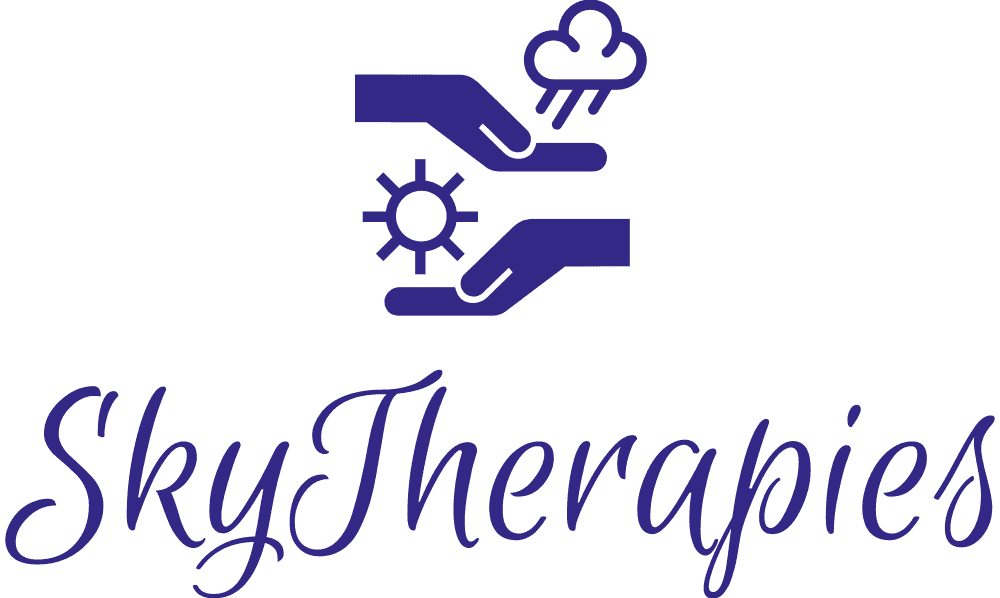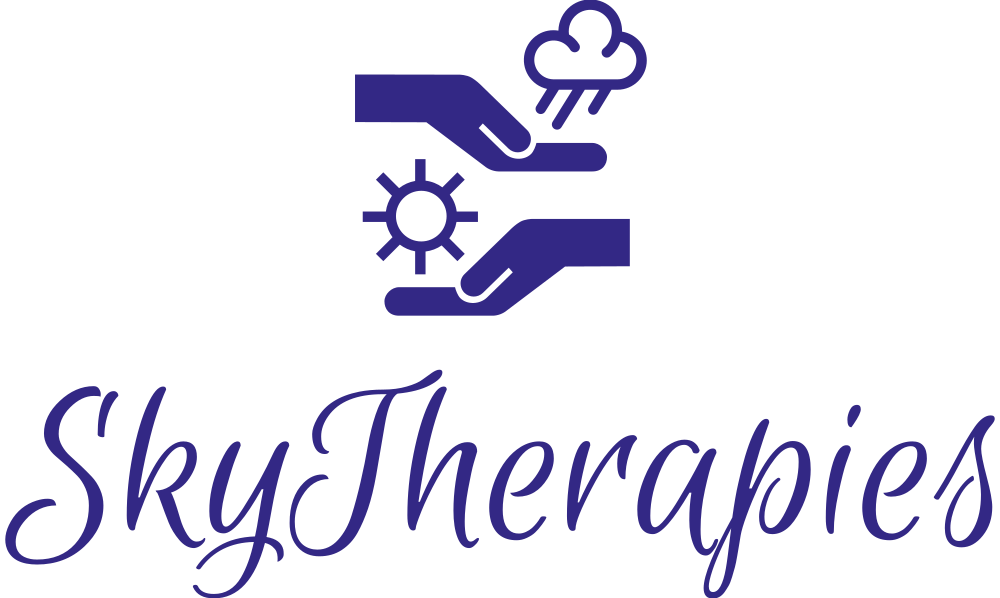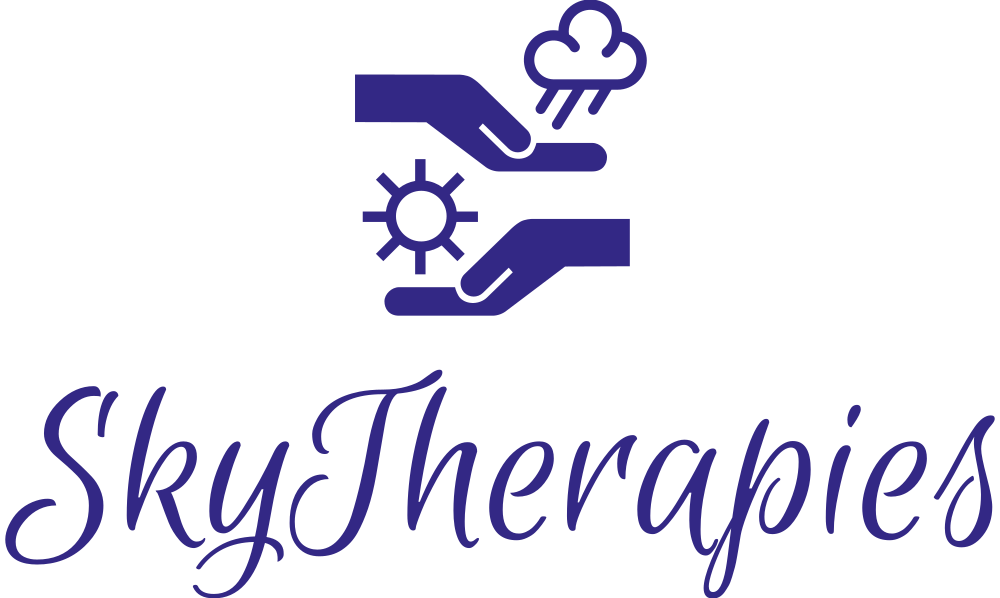-
Online Therapy For Toronto And Throughout Ontario
-
865 York Mills Rd #20, Toronto, ON M3B 1Y6
-
Online Therapy For Toronto And Throughout Ontario
-
865 York Mills Rd #20, Toronto, ON M3B 1Y6
SERVICES
Virtual Dialectical Behavior Therapy (DBT)
Across Ontario

At Sky Therapies, we understand that life can sometimes feel overwhelming, and the emotional challenges you face may feel like too much to manage. If you struggle with intense emotions, difficulty in relationships, or self-destructive behaviors, Dialectical Behavior Therapy (DBT) may be an approach that can help you find balance and peace.
In this page, we will explain what DBT is, how it works, and how it can be a transformative tool for your mental health journey here at Sky Therapies.
For more information, contact us to book free phone consultation.

Dialectical Behavior Therapy
What isDialectical Behavior Therapy (DBT)
Dialectical Behavior Therapy (DBT) is a specialized form of therapy developed by Dr. Marsha Linehan in the 1980s to treat individuals with borderline personality disorder (BPD). However, over time, DBT has proven to be helpful for a wide range of emotional and mental health challenges. DBT integrates cognitive-behavioral techniques with mindfulness practices and focuses on balancing acceptance with change.
The term “dialectical” refers to the concept of finding balance between two opposing ideas—accepting yourself as you are while also working to make meaningful changes in your life. In DBT, we work on both accepting and validating your current emotional state while also helping you develop the skills to navigate intense emotions and improve your quality of life.
DBT focuses on teaching practical skills to manage emotions, improve relationships, and promote healthier ways of thinking. It’s often structured into four key areas: Mindfulness, Distress Tolerance, Emotional Regulation, and Interpersonal Effectiveness. By working on these skills, DBT helps you build a life that feels worth living.
DBT Work
How Does DBT Work?
DBT is different from other types of therapy in a few ways. Here’s a breakdown of how DBT works and what you can expect when working with us at Sky Therapies.
- A Strong Focus on Skills Building
The core of DBT is learning specific skills to help you better manage your emotions, improve your relationships, and cope with distress. These skills are taught in a structured format that you can practice both during sessions and in your daily life.There are four main skill sets that DBT emphasizes:- Mindfulness: Mindfulness is the ability to be fully present in the moment, without judgment. It’s about observing your thoughts, feelings, and physical sensations without getting overwhelmed by them. Mindfulness helps you stay grounded and focused, especially during emotional or stressful situations.
- Distress Tolerance: Distress tolerance skills help you tolerate difficult emotions without resorting to harmful coping mechanisms. These skills focus on accepting things as they are in the moment and finding ways to ride out the storm of intense feelings without making impulsive decisions.
- Emotional Regulation: Emotional regulation skills help you better understand and manage your emotions. Rather than feeling overwhelmed or out of control by your feelings, you’ll learn how to recognize your emotional responses and make choices that support your well-being.
- Interpersonal Effectiveness: Interpersonal effectiveness skills teach you how to build healthier relationships, communicate your needs clearly, and manage conflicts in a constructive way. This includes learning how to assert yourself, set boundaries, and maintain relationships while balancing your own needs.
- Individual Therapy and Skills Training
DBT at Sky Therapies combines both individual therapy sessions and group skills training. Individual therapy focuses on helping you apply the DBT skills to your unique life challenges, while group therapy provides a space to learn and practice those skills with others who are going through similar experiences.In individual therapy, your therapist will help you identify areas where you may struggle, whether that’s managing your emotions, facing overwhelming stress, or navigating challenging relationships. Together, you’ll work on creating a personalized plan that addresses your specific concerns while teaching you how to apply DBT techniques.In group skills training, you’ll be taught DBT skills in a supportive, structured environment with other individuals working toward similar goals. This aspect of DBT helps reinforce the skills you’ve learned in individual therapy and gives you the opportunity to practice them in a safe, collaborative setting. - Focus on Validation and Acceptance
A key aspect of DBT is validation—acknowledging and accepting your feelings and experiences as real and important. In DBT, we work on validating your emotions, even when they feel intense or difficult. We recognize that your emotions are valid, and we help you explore them in a way that brings understanding and compassion.At the same time, DBT encourages change. We believe that change is possible, and while it’s important to accept where you are, it’s equally important to take steps toward living a life that is more fulfilling and aligned with your values. This balance of acceptance and change is at the heart of DBT and helps you build a healthier, more balanced way of coping with life’s challenges. - Phone Coaching and Support Between Sessions
One of the unique features of DBT is the availability of phone coaching between sessions. If you find yourself struggling with intense emotions or challenging situations in your day-to-day life, your therapist can offer coaching and support to help you use DBT skills in real time. This ongoing support helps you apply what you’re learning in therapy to your daily life, making it easier to manage emotional challenges as they arise.
DBT Help With
What Issues Can DBT Help With?
While DBT was originally developed to treat individuals with borderline personality disorder, it is now used to help people with a wide range of mental health challenges. DBT is particularly effective for individuals who experience intense emotions or struggle with self-destructive behaviors, such as self-harm, impulsivity, or substance abuse. Some of the issues DBT can help with include:
- Borderline Personality Disorder (BPD)
DBT was specifically developed to treat BPD, which is characterized by unstable emotions, difficulty maintaining relationships, and impulsive behaviors. DBT helps individuals with BPD learn to regulate their emotions, tolerate distress, and develop healthier relationships. - Depression and Anxiety
DBT helps individuals with depression and anxiety by teaching emotional regulation skills and mindfulness techniques that can reduce negative thinking patterns and improve emotional resilience. - Self-Harm and Suicidal Thoughts
If you’re struggling with self-harm behaviors or thoughts of suicide, DBT provides strategies to cope with these intense feelings in healthier ways. It focuses on helping you find new ways to manage pain and emotional distress. - Eating Disorders
DBT has been shown to be effective in treating eating disorders such as binge eating, anorexia, and bulimia. By teaching mindfulness, emotional regulation, and distress tolerance, DBT can help individuals address the emotional triggers behind disordered eating behaviors. - Post-Traumatic Stress Disorder (PTSD)
DBT can help individuals who have experienced trauma by teaching them how to manage the intense emotions that can arise from flashbacks or intrusive memories. DBT also helps with emotional regulation, which is often a key challenge for those with PTSD. - Relationship Issues
DBT’s emphasis on interpersonal effectiveness can be incredibly helpful for individuals who struggle with maintaining healthy relationships. It teaches you how to communicate more effectively, set boundaries, and navigate conflicts in a constructive way.
Expectations
What to Expect in DBT Therapy at Sky Therapies
At Sky Therapies, we take a compassionate, personalized approach to DBT. Here’s what you can expect during your DBT therapy sessions:
- Assessment and Goal Setting
In the beginning, you and your therapist will work together to assess your emotional struggles, behaviors, and specific goals for therapy. You’ll have the opportunity to explore what brought you to therapy and identify areas where DBT can help you the most. - Learning DBT Skills
As therapy progresses, you’ll begin learning and practicing the core DBT skills: mindfulness, distress tolerance, emotional regulation, and interpersonal effectiveness. These skills will be applied both in your therapy sessions and in your daily life. Over time, you’ll gain confidence in using these tools to handle difficult situations. - Ongoing Support
Throughout your DBT journey, you’ll receive ongoing support from your therapist. Whether you need coaching between sessions or help navigating real-world challenges, we are here to support you every step of the way. - A Collaborative and Compassionate Relationship
DBT therapy is based on a strong therapeutic alliance, where you and your therapist work together as a team. Our therapists at Sky Therapies are empathetic, non-judgmental, and committed to helping you make lasting change. We believe in the power of validation and are dedicated to helping you accept yourself while also striving for improvement.
Why Us
Why Choose DBT at Sky Therapies?
At Sky Therapies, we understand that emotional struggles are complex, and we approach DBT with compassion and empathy. Our DBT therapists are trained to work with individuals who experience intense emotions, self-destructive behaviors, and relationship difficulties. Here are some reasons to consider DBT with us:
- Personalized Support:
We tailor DBT to your specific needs and challenges, ensuring that you receive the most effective support for your unique situation. - Comprehensive Approach:
DBT is a holistic approach that focuses on both acceptance and change. It gives you the tools to manage your emotions, improve relationships, and create positive change in your life. - Experienced Therapists:
Our therapists are highly trained in DBT and bring a compassionate, non-judgmental approach to every session. We’re here to support you in building a life worth living.
Right for You
Is DBT Right for You?
If you struggle with emotional intensity, relationship difficulties, self-destructive behaviors, or mental health challenges such as anxiety or depression, DBT may be a helpful approach for you. If you’re ready to take control of your emotions, build stronger relationships, and create lasting positive changes in your life, we’re here to help.
Contact us today to learn more about DBT at Sky Therapies or to schedule an appointment with one of our experienced therapists. Let us support you on your journey toward emotional balance and a life that feels fulfilling and meaningful.
Dialectical Behavior Therapy Ontario
865 York Mills Rd #20,
Toronto, ON M3B 1Y6



